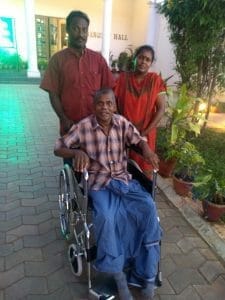With an open sore infested with maggots and blood staining her blouse, S Husena, a 56-year-old cancer patient from Tambaram had given up on life. Diagnosed with fourth stage breast cancer, she knew death was near. As she witnessed her body being eaten away by maggots, Husena felt a strong urge to kill herself.
Her life took a positive turn after the volunteers from one of the palliative care organisations in Chennai treated her. The nurse not only convinced Husena to take pain killers, but also treated her infection. This enabled the patient to accept her illness and allow the family to take care of her. She no longer feels that she’s a burden on her sister’s family, her caretakers.
“Ever since Husena’s husband abandoned her, she became aloof and preferred isolation. Only after I saw pus and blood on her blouse did I understand the seriousness of her illness,” recalls Husena’s sister. Oncologists, who diagnosed her with fourth stage cancer, merely asked the family to take her home, without giving any pain management medication or counselling to cope with the disease. It was then that they approached the palliative caregivers.
What is palliative care?
It is widely understood that palliative care refers to rehabilitation of patients suffering from chronic or end-of-life diseases. However, palliative care covers the holistic health of a patient, addressing his emotional, spiritual and financial needs, besides the physical suffering.
“A listening ear, a soothing word and genuine care for those in need are all part of palliation,” says Dr Lina Uthap, trustee of Soul Palliative Care Foundation (SPCF). Soul Palliative Care Foundation has been one of the noted organisations in Chennai that tend to poor patients in need of such care.
G Anandan from Taramani, in his 50s, had fallen off a three-storied building while carrying a cement sack, 34 years ago. Having lost senses in the lower part of the body, he had been confined to his bed since the incident. The members of SPCF donated a wheelchair to him, which helped him go out and interact with people.
In Husena’s case, counselling and care provided the necessary palliation, whereas a wheelchair made all the difference for Anandan. Palliation thus doesn’t have to be essentially for terminally ill patients, as it is about providing solutions to patients’ problems. The significance of palliation lies in its role in helping the patient lead a painless and dignified life, whatever the stage or nature of disease.
When 89-year-old Duraikannan from Pallavaram suffered from multiple age-related ailments but was adamant on not taking medication, the members of SPCF convinced him by constant counselling. “I would ask him about his teenage days and hobbies, to ease him out. He trusted me and heeded my words,” said Subathra Oorakatill, a nurse of SPCF. From cleaning his wounds to listening to his stories, Subathra has done it all. An usually grumpy person, Duraikannan started smiling during his last days. Palliative care helped him attain dignity in death.
Addressing the gap
While citizens belonging to the upper middle class can afford to hire a nurse, poor people mostly give up on terminally ill patients. “A daily wage labourer can’t skip work to change diapers of his bedridden wife, thrice a day. At the same time, he doesn’t earn enough to employ a house nurse. That’s when organisational help does wonders,” explained Dr Lina.
Despite its critical role, however, palliative care is not given enough focus in medical colleges. “While the Indian Medical Council introduced palliative medicine at the Masters (MD) level, there is barely a paragraph about it in the MBBS curriculum,” said Arun Ravula, who completed his MBBS in 2015.
“The medical fraternity is disease-oriented and often overlook the range of needs of people with chronic illness. Palliative care would help a doctor be empathetic towards the patient and look at things through a broader lens,” said Dr Mallika Thiruvadanan, Adjunct Professor at The Tamilnadu Dr MGR Medical University, who is also running Lakshmi Pain and Palliative Care Trust.
| Contacts of a few centres in Chennai
Ashirwadh care homes – 9152194222 Soul Palliative Care Foundation -9841313433 Lakshmi Pain and Palliative Care Trust – 044 2532 2684 RMD Pain and Palliative Care Trust – 044 2815 7373 Pain and Palliative Care Clinic – 098410 23540 Turiya Health Care – 04445550256 Dean Foundation – 8220499992 |
Safer alternative to euthanasia
At a time when many activists and medical professionals are advocating for legalisation of active euthanasia in India, to ensure a painless and dignified end for patients suffering from terminal illness, many feel that good and more widely available palliative care would be a safe alternative.
“Through palliative care, people with chronic illness are rehabilitated, enabling self-sustenance. If palliative medicine reaches the primary health care centres and government hospitals in villages, euthanasia will not need to come to the fore at all,” said Preetha Mahesh, Founder Trustee, SPCF.
